September is Prostate Cancer Awareness Month. To increase awareness, Medivizor is sharing a theory from researchers at Johns Hopkins University School of Medicine that attempts to explain what may be causing men in Europe and the US to be so vulnerable to prostate cancer.
What does the prostate gland do?
The prostate gland is part of the male reproductive system. It creates one of the fluids, prostate fluid, that make up semen. This fluid is contains PSA (an enzyme which thins semen) and a hormone, spermine, that helps sperm move more effectively. The prostate is also the place where the hormone testosterone is changed to dihydrotestosterone.
Evolution, Food and the Prostate
Non-mammals do not have prostate glands. They only have seminal vesicles. Many mammals, like humans, have both prostate glands and seminal vesicles to create the fluid that makes up semen. Interestingly, the prostate gland and seminal vesicles are not found in all mammals. Carnivores have only prostate glands; they lack seminal vesicles. But herbivores, mammals that are plant eaters, have both seminal vesicles and prostate glands.
Is man meant to eat only plants and very little, if any meat? 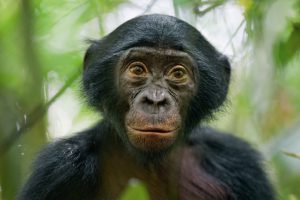 Could the introduction of meat be a problem for the prostate gland? The apes that are some of our closest relations on the evolutionary family tree, bonobos, are vegetarians and do not get prostate cancer. Researchers estimate that humans have gone from eating as many as 3000 types of vegetables and greens (as foragers) to around 20. The only other animal that gets prostate cancer to any large extent is the dog, the animal that eats our table scraps.
Could the introduction of meat be a problem for the prostate gland? The apes that are some of our closest relations on the evolutionary family tree, bonobos, are vegetarians and do not get prostate cancer. Researchers estimate that humans have gone from eating as many as 3000 types of vegetables and greens (as foragers) to around 20. The only other animal that gets prostate cancer to any large extent is the dog, the animal that eats our table scraps.
Don Coffey, PhD., researcher at Johns Hopkins University School of Medicine, has been looking at these evolutionary distinctions and further pursuing the reasons that prostate cancer occurs more in Western countries than anywhere else. He has been exploring the fact that when people move from other parts of the world with low rates of prostate cancer, to places with high rates, their risk of getting prostate cancer increases. He believes diet is the answer.
To test his hypothesis, he and colleagues John Isaacs, Angelo De Marzo, Alan Meeker, and Bill Nelson have looked at what is happening inside the prostate, in the cells and the environment where they live.
What makes up the prostate gland?
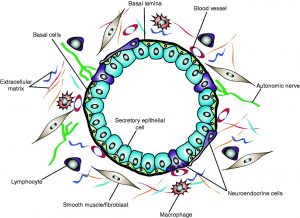 The prostate gland is made up of branching glands composed of ducts. The cells of the ducts are arranged like the image on the left. Prostate gland fluid is secreted by the large epithelial cells (in teal). They secrete fluid into the open space in the center (called the lumen). In the layer just below the larger teal colored cells are basal cells. Here is where stem cells are also located. Stem cells are cells that have the capacity to become other cells (called pluripotent).
The prostate gland is made up of branching glands composed of ducts. The cells of the ducts are arranged like the image on the left. Prostate gland fluid is secreted by the large epithelial cells (in teal). They secrete fluid into the open space in the center (called the lumen). In the layer just below the larger teal colored cells are basal cells. Here is where stem cells are also located. Stem cells are cells that have the capacity to become other cells (called pluripotent).
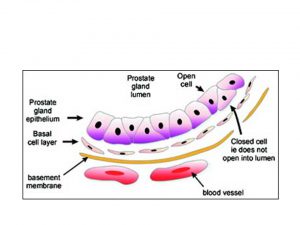
A closer look at a section of this structure can help you to see those basal cell layer. They are in light pink in the image to the right. These stem cells are surrounded by protective proteins like glutathione-S transferase p. These proteins protect the DNA in the stem cells from being damaged.
What Coffey and his colleagues have found is that if there is a change in this 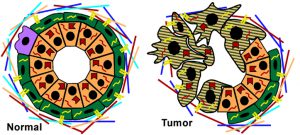 environment–for example, the protective glutathione-S transferase p is lost– the stem cells and secretory epithelial cells are disrupted. The secretory epithelial cells start to grow in an out-of-control manner. (See the image to the left). As this occurs, the DNA of the cancer becomes less and less like normal DNA. The greater the variability in the cancer cells compared to normal secretory epithelial cells, the more difficult the cancer is to treat.
environment–for example, the protective glutathione-S transferase p is lost– the stem cells and secretory epithelial cells are disrupted. The secretory epithelial cells start to grow in an out-of-control manner. (See the image to the left). As this occurs, the DNA of the cancer becomes less and less like normal DNA. The greater the variability in the cancer cells compared to normal secretory epithelial cells, the more difficult the cancer is to treat.
Cancer Initiation and Progression
Through autopsies, the first signs of prostate cancer (pre-cursors), have been found in men in every country the world. So “whatever causes prostate cancer in the first place — the initiating factors or events — happen worldwide.” However, only in Western countries, the small, early stages of prostate cancer progress to full blown prostate cancer.
Men living in the US and Europe are 10 times more likely to get prostate cancer than people living in Asia. Figuring out why this happens and how to prevent the progression to full blown cancer occurs is a puzzle. Perhaps lifestyle factors, like being active and eating less meat and more vegetables and fruit are key.
Infographic
To increase awareness, we are sharing an infographic by City of Hope Healthcare.

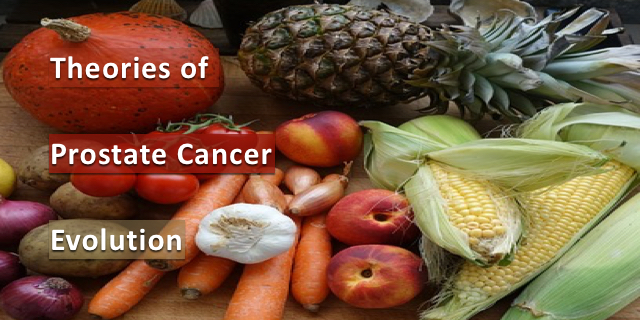


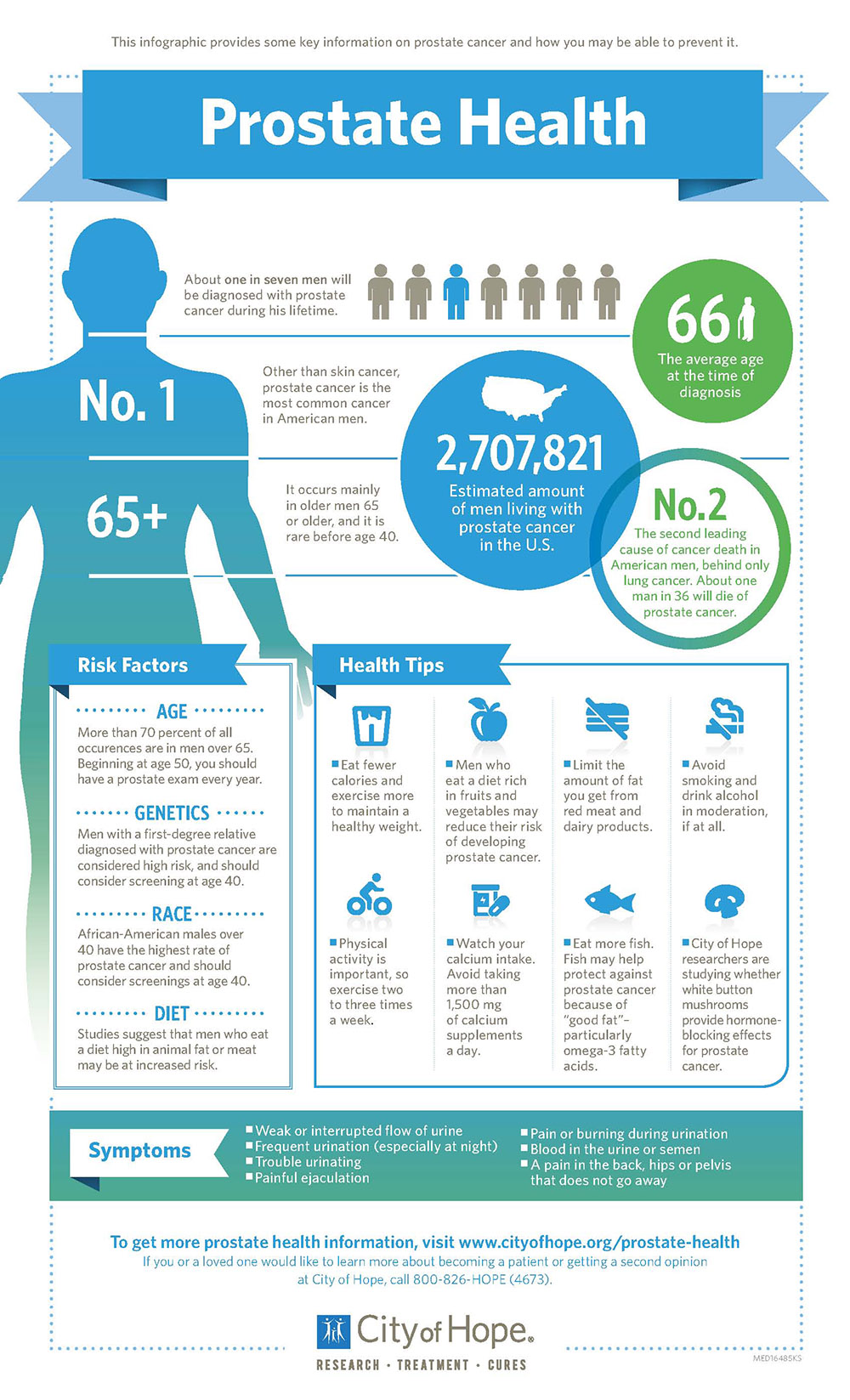


Hello, I’m here for my husband with Prostate cancer and many masses. I would love to use this service.
i am kind of concerned. i urinate frequently at night. but my PSA is low.
and also my prostate in normal size. i am 66 years old.
Where does Genetic Mutations fall in this list?
Could vegetarians really hold off Prostate cancer in BRCA Mutation carriers?